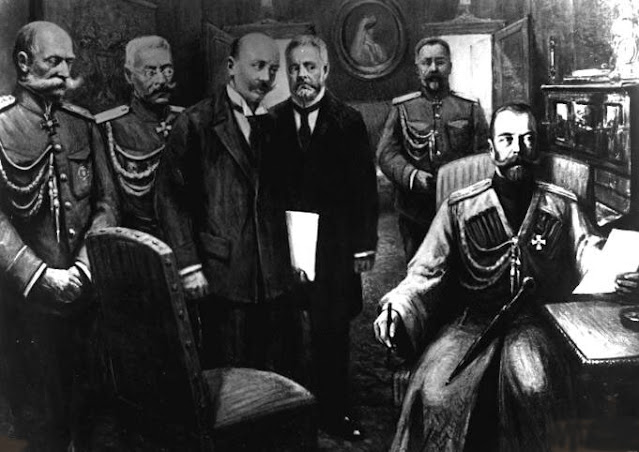At the start of 1917, Russia was in shambles. The country’s severe military losses at the height of World War I (1914-1918) drained whatever morale was left at the front and at home; a general strike and a mutiny of the garrison in Petrograd sparked the February Revolution in 1917 and the disintegration of the monarchy's authority. A helpless Czar Nicholas II finally surrendered authority and abdicated, making the end of the House of Romanov’s three-century rule of Russia.
By February 1917, more than 1.7 million Russian soldiers had
perished in World War I. Due to harsh winter and severe food shortages, the
people broke into shops and bakeries and unrest in Petrograd no sooner ensued
on February 23. The situation worsened and
crowds marched on the streets, chanting "Down with the German
woman! Down with Protopopov! Down with the war! Down with the Tsar!" With
waning moral on the czar and his regime,
on March 12, several regiments of
the Russian Army one by one rose up against the czar. The Volinsky Regiment mutinied and was
quickly followed by the Semenovsky, the Ismailovsky, the Litovsky Life Guards
and even the legendary Preobrazhensky Regiment of the Imperial Guard, the
oldest and staunchest regiment founded by Peter the Great. Members of the Duma (the
lower house of Russia’s legislative assembly) and the Soviet attempted to
restore order and formed a Provisional Government and demanded that Nicholas
abdicate. Helpless, deprived of support from his loyal troops, and with his
family firmly in the hands of the Provisional Government, the czar also feared
of unleashing civil war and opening the way for German conquest. Left with
little choice, Nicholas signed the manifesto of abdication in Pskov on March
15, 1917. The Emperor renounced the throne of the Russian Empire for himself
and on behalf of his son, Tsarevich Alexei Nikolaevich, in favor of his brother
Grand Duke Michael Alexandrovich. However, the Grand Duke refused to accept the
imperial authority, unless he obtains a democratic consensus of the Russian
Constituent Assembly, which shall define the form of government for Russia. The
czar’s abdication and Grand Duke Michael’s decision finally ended the 300
year-old of the House of Romanov. Power in Russia then passed to the Russian
Provisional Government, signaling the victory for the February Revolution.
Here is the text of Nicholas II’s Manifesto of Abdication:
In the days of the great struggle against the foreign
enemies, who for nearly three years have tried to enslave our fatherland, the
Lord God has been pleased to send down on Russia a new heavy trial. Internal
popular disturbances threaten to have a disastrous effect on the future conduct
of this persistent war. The destiny of Russia, the honor of our heroic army,
the welfare of the people and the whole future of our dear fatherland demand
that the war should be brought to a victorious conclusion whatever the cost.
The cruel enemy is making his last efforts, and already the hour approaches
when our glorious army together with our gallant allies will crush him. In
these decisive days in the life of Russia, We thought it Our duty of conscience
to facilitate for Our people the closest union possible and a consolidation of
all national forces for the speedy attainment of victory. In agreement with the
Imperial Duma We have thought it well to renounce the Throne of the Russian
Empire and to lay down the supreme power. As We do not wish to part from Our
beloved son, We transmit the succession to Our brother, the Grand Duke Michael
Alexandrovich, and give Him Our blessing to mount the Throne of the Russian
Empire. We direct Our brother to conduct the affairs of the nation with the
representatives of the people in the legislative bodies on those principles
which will be established by them, and on which He will take an inviolable
oath. In the name of Our dearly beloved homeland, We call on Our faithful sons
of the fatherland to fulfill their sacred duty to the fatherland, to obey the
Tsar in the heavy moment of national trials, and to help Him, together with the
representatives of the people, to guide the Russian Empire on the road to
victory, welfare, and glory. May the Lord God help Russia!



.png)





0 Comments